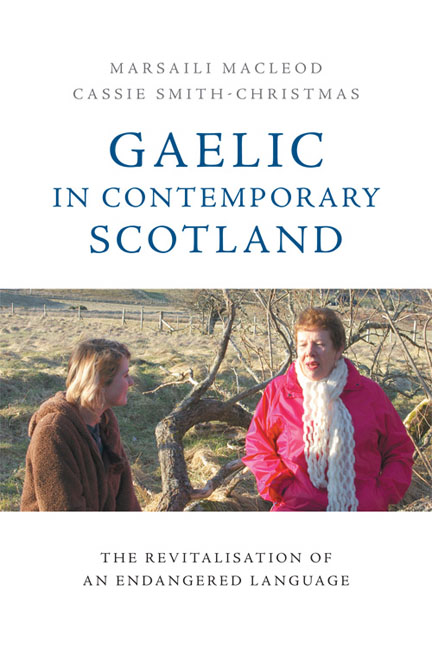Book contents
- Frontmatter
- Contents
- List of Figures
- List of Tables
- Notes on Contributors
- Foreword: Assailed yet Resolute
- Acknowledgements
- List of Abbreviations
- 1 Introduction
- 2 The Language of the Playground: Activists Building Consensus on the Language Policy and Ethos of a New Gaelic Immersion School
- 3 Mismatches between National and Local Gaelic Development: Cròileagan Dùn Èideann and the Promotion of Gaelic-medium Education
- 4 Gaelic amongst Schoolchildren: Ideas on Language Change and Linguistic Choices in Gaelic
- 5 When School is Over and Done With: Linguistic Practices and Sociodemographic Profiles of Gaelic-medium Educated Adults
- 6 New Speakers of Gaelic: A Historical and Policy Perspective
- 7 Learning Gaelic in Adulthood: Second Language Learning in Minority Language Contexts
- 8 Dlùth is Inneach: Charting Language Ideology in the Contemporary Gaelic World
- 9 Gaelic Language Use in Public Domains
- 10 Planning for Growth: The Professionalisation of the Taskforce for Gaelic Revitalisation
- 11 Organisational Language Planning: Gaelic Language Plans in the Public Sector
- 12 The Future of Gaelic Language Revitalisation in Scotland
- Index
3 - Mismatches between National and Local Gaelic Development: Cròileagan Dùn Èideann and the Promotion of Gaelic-medium Education
Published online by Cambridge University Press: 18 December 2019
- Frontmatter
- Contents
- List of Figures
- List of Tables
- Notes on Contributors
- Foreword: Assailed yet Resolute
- Acknowledgements
- List of Abbreviations
- 1 Introduction
- 2 The Language of the Playground: Activists Building Consensus on the Language Policy and Ethos of a New Gaelic Immersion School
- 3 Mismatches between National and Local Gaelic Development: Cròileagan Dùn Èideann and the Promotion of Gaelic-medium Education
- 4 Gaelic amongst Schoolchildren: Ideas on Language Change and Linguistic Choices in Gaelic
- 5 When School is Over and Done With: Linguistic Practices and Sociodemographic Profiles of Gaelic-medium Educated Adults
- 6 New Speakers of Gaelic: A Historical and Policy Perspective
- 7 Learning Gaelic in Adulthood: Second Language Learning in Minority Language Contexts
- 8 Dlùth is Inneach: Charting Language Ideology in the Contemporary Gaelic World
- 9 Gaelic Language Use in Public Domains
- 10 Planning for Growth: The Professionalisation of the Taskforce for Gaelic Revitalisation
- 11 Organisational Language Planning: Gaelic Language Plans in the Public Sector
- 12 The Future of Gaelic Language Revitalisation in Scotland
- Index
Summary
In this chapter, I will describe how a colourful new information pack produced by the national statutory language board, Bòrd na Gàidhlig, and the reaction to it of the play leaders at a Gaelic parent-and-child group helped me to understand parents’ first stages of involvement with Gaelic. Research into Gaelic-medium education choice has focused on why parents choose Gaelic-medium education (Roberts 1991; Stockdale et al. 2003; O'Hanlon et al. 2010; Goalabré 2011; O'Hanlon 2012; Rice 2012; McLeod and O'Rourke 2015; O'Hanlon and Paterson 2016). Most of this research asked parents with children already in Gaelic-medium primary education about their reasons for enrolling their child in the provision some, often many, years previously. Exceptions to this include Stephen et al. (2010), whose research into early years pro-vision included exploring Gaelic-medium education choice amongst parents of pre-school children, and also O'Hanlon and Paterson (2016: 2), which utilised a national social attitudes survey to investigate what factors influenced respondents to tick that ‘they would be likely to choose Gaelic-medium primary education for their own child’. There is a paucity of research into parents who are in the process of considering Gaelic-medium education or are yet to consider formal education but are involved in Gaelic provision at the early years. Rather than focusing on education choice, in this chapter I will examine how parents are supported by play leaders and fellow parents at Gaelic parent-and-child groups at this initial stage of involvement in Gaelic-medium education and how the role of these groups is wider than promoting and encouraging Gaelic-medium education enrolment at primary level.
This chapter is based on six-months of ethnographic fieldwork within Cròileagan Dùn Èideann. I regularly attended Cròileagan sessions across all locations, includ-ing participant observation at fifty-seven sessions, and I conducted semi-structured interviews with play leaders, parents – from twenty-six families in total – and Gaelic-medium education staff. Researchers in Language Planning and Policy are increasingly engaging with ethnography as a research method to understand the ‘interpretation and implementation’ of language policy at a local level (Hornberger and Johnson 2007: 511). Rather than examining the interpretation of a specific policy at a local level, in this chapter I will explore how concerns regarding a new information pack illumi-nated differences in priorities and understandings between local- and national-level organisations.
- Type
- Chapter
- Information
- Gaelic in Contemporary ScotlandThe Revitalisation of an Endangered Language, pp. 32 - 44Publisher: Edinburgh University PressPrint publication year: 2018



